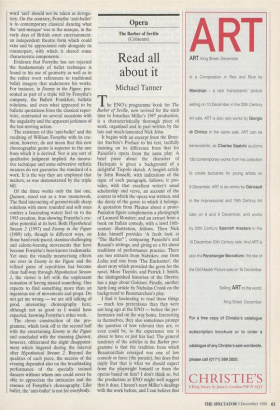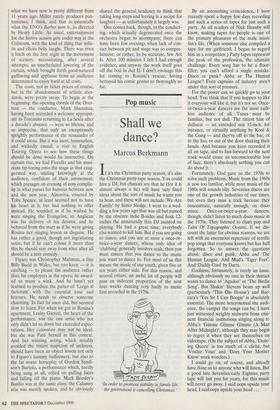Opera
Read all about it
Michael Tanner
The ENO's programme book for The Barber of Seville, now revived for the sixth time in Jonathan Miller's 1987 production, is a characteristically thorough piece of work, organised and in part written by the late and much-lamented Nick John.
It begins with an excerpt from the libret- tist Sterbini's Preface to his text, tactfully insisting on its difference from that for Paisiello's opera from the same play. A brief piece about the character of Harlequin is given a background of a delightful Tiepolo sketch. A longish article by John Rosselli, with indications of the topic of each paragraph, follows; it pro- vides, with that excellent writer's usual scholarship and verve, an account of the context in which the opera was written, and the decay of the genre to which it belongs. A quotation from Plautus about a proto- Pantalon figure complements a photograph of Leonard Rossiter; and an extract from a book on Italian comedy, with a lewd 16th- century illustration, follows. Then Nick John himself provides 'A fresh look at "The Barber", comparing Paisiello's and Rossini's settings, and giving us a bit about traditions of performance practice. There are two extracts from Nabokov, one from Lolita and one from 'The Enchanter', the short story which provided the germ for the novel. More Tiepolo, and Patrick J. Smith, the distinguished historian of the libretto, has a page about Goldoni. Finally, another fairly long article by Nicholas Cronk on the background to Beaumarchais's play.
I find it fascinating to read these things — much less pretentious than they were not long ago at the ENO — before the per- formance and on the way home. Interesting in themselves, they also sometimes prompt the question of how relevant they are, or even could be, to the experience one is about to have or just has had. The general tendency of the articles in the Barber pro- gramme is that the tradition from which Beaumarchais emerged was one of low comedy or farce (the parade), but does that imply that that is what we should expect from the playwright himself or from the operas based on him? I don't think so, but the production at ENO might well suggest that it does. I haven't seen Miller's dealings with the work before, and I can believe that what we have now is pretty different from 11 years ago. Miller rarely produces pan- tomimes, I think, and that is essentially what the ENO's Barber now is, as directed by Henry Little. As usual, entertainment for the festive season gets under way at the Coliseum, with the kind of thing that solic- its and elicits belly laughs. There was even a hitch on the first night in the movement of scenery, necessitating, after several attempts, an unscheduled lowering of the curtain, which brought forth good-natured guffawing and applause from an audience determined to enjoy itself at all costs.
The costs, not in ticket prices of course, but in the abandonment of artistic stan- dards, were pretty steep. To begin at the beginning: the opening chords of the Over- ture — the conductor, Mark Shanahan, having been accorded a welcome appropri- ate to Toscanini returning to La Scala after a decade's absence — were so lifeless, and so imprecise, that only an exceptionally sprightly performance of the remainder of it could atone. But it was inert, humourless, and wickedly casual; a visit to English Touring Opera to see how these things should be done would be instructive. On curtain rise, we had Fiorello and his musi- cians tip-toeing onto the stage in that exag- gerated way, smiling knowingly at the audience, confident of their amusement, which presages an evening of cosy complic- ity in what passes for humour between now and the new year. Almaviva, enacted by Toby Spence, at least seemed not to have 4is heart in it, but had nothing to offer instead. He sounded as if he wished he were singing the Evangelist, so Anglican was his delivery of his desires; and he behaved from the start as if he were giving Rosina her singing lesson in disguise. He has rather a good, though not ingratiating voice, but if he can't colour it more than this he should stay away from what after all should be a sexy comedy.
Figaro was Christopher Maltman, a fine Billy Budd in Wales, but too keen — it is catching — to please the audience rather than his employers in the opera; he award- ed us many a wink. And he hasn't yet learned to produce the patter of 'Largo al factotum' with the essential ease and bravura. He needs to observe someone charming. In fact he soon did, but seemed slow to learn. For when we got to Rosina's apartment, Lesley Garrett, the heart of the performance, was the one artist who not only didn't let us down but exceeded expec- tations. Her coloratura may not be ideal, but she was Patti herself in this context. And her winning acting, which notably avoided the tiniest suspicion of archness, should have been an object lesson not only to Figaro's hammy buffoonery, but also to the far worse horseplay of Gordon Sandi- son's Bartolo, a performance which, hardly being sung at all, relied on pulling faces and falling off the piano. Mark Beesley's Basilio was in the same class; the Calumny aria was merely spoken, and he obviously shared the general tendency to think that taking long steps and leering is a recipe for laughter — as unfortunately it largely was.
One comes back, though, to the conduct- ing, which actually degenerated once the orchestra began to accompany; there can have been few evenings when lack of con- tact between pit and stage was so compre- hensive: or rather, to be accurate, few Act Is. After 100 minutes I felt I had enough evidence, and anyway the work itself goes off the boil in Act II. I don't envisage this lot coming to Rossini's rescue, having betrayed his comic genius so thoroughly so far.



















































































 Previous page
Previous page